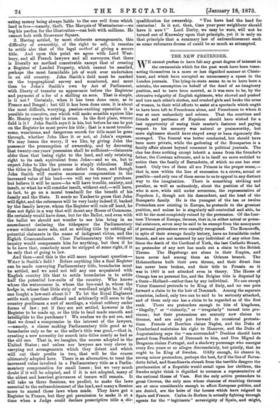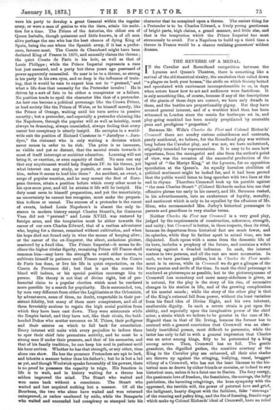THE NEW PRETENDER.
agents for the "legitimate" sovereignty of Spain, and might,
mere sightseers should have stayed away or been rigorously dis- couraged. The funeral was better conducted, but should have been more private, while the gathering of the Bonapartes is a family affair almost beyond comment in political journals. The clan has done nothing except inherit a name from the founder's father, the Corsican advocate, and is in itself no more entitled to notice than the family of Bernadotte, of which no one has ever heard. Only two of them all are Princes in the proper sense,— that is, men within the line of succession to a crown, actual or possible—and only one of them seems to us to appeal in any distinct way to the imagination. There is something striking and peculiar, as well as melancholy, about the position of the lad who is now, while still under seventeen, the representative of Napoleon I., though not his descendant, and the head of the Bonaparte family. He is the youngest of the ten or twelve Pretenders now existing in Europe, he pretends to the greatest position, and unless he is singularly self-controlled and able, he will be the most completely ruined by the pretension. Of the four- teen Thrones of Europe, thrones, that is, in either actual or poten- tial existence, seven may be said to be exempt from the annoyance of personal pretensions even casually recognised. The Romanoffs, in spite of their strange family history, have no formidable cadet branch, and are not menaced by any individual of any other line. Since the death of the Cardinal of York, the last Catholic Stuart, no pretender of any sort has made out a claim to the British Throne. The Hapsburgs are alone in their Empire, and have never had among them an Orleans branch. The Hohenzollerns built their own throne, and their direct line has never been broken, and their title to Prussia as it was in 1860 is not attacked even in theory. The House of were his party to develop a peat General within the regular army, or were a man of genius to win the tiara, attain his ambi- tion for a time. The Prince of the Asturias, the eldest son of Queen Isabella, though quiescent and little known, is of all men alive perhaps the one who has the best chance of dying King of Spain, being the one whom the Spanish army, if it has a prefer- ence, favours most. The Comte de Chambord might have been declared King of France in 1870, and annually claims the throne ; the quiet Comte de Paris is his heir, as well as that of Louis Philippe ; while the Prince Imperial represents a race but just unseated, and a party but three years ago possessed of power apparently unweaned. So near is he to a throne, so strong is his party in his own eyes, and so deep is the influence of train- ing, that it would be vain to expect him not to "pretend," and what a life does that necessity for the Pretender involve ! He is driven by a sort of fate to be either a conspirator or a failure. No position tends to spoil the character like that of a pretender. An heir can become a political personage like the Crown Prince, or lead society like the Prince of Wales, or be himself merely, like the Prince of Orange, waiting until his turn arrive in passive security ; but a pretender, and especially a pretender claiming like the Napoleons, through the popular will as well as heirship, must always be dreaming, always unsatisfied, always feeling that every career but conspiracy is utterly insipid. He occupies in a world- wide suit the position of Richard Carstone in " Jarndyce v. Jarn- dyce," the claimant who is only waiting a decision which never comes in order to be rich. The prize is so immense, so visible and yet so distant, that the mental strain towards it must of itself interrupt or embitter education. Learning will not bring it, or exertion, or even capacity of itself. No man can say that any acquirement would help Napoleon IV. to his throne, yet what interest can any study, or pursuit, or even habit have for him, unless it seems to lead him there ? An accident, an event, a surge of popular emotion, and he may mount the first of Euro- pean thrones, attain a position before which every other must in his eyes seem poor, and till he attains it life will be insipid. His duty must seem to himself preparation, and yet the uncertainty, an uncertainty he cannot but recognise, must make the prepara- tion tedious or unreal. The success of a pretender is the rarest of events, indeed Louis Napoleon's is almost the only in- stance in modern history except Charles Stuart's, for Gustavus Vasa did not " pretend " and Louis XVIIL was restored by foreign arms, and the temptation must be either towards the career of our own Charles Edward, that of a restless adventurer who, hoping for a throne, remained without cultivation, and when his hope died out found only in wine the means of keeping alive ; or the career of the ex-Emperor, the silent, audacious plotter, mastered by a fixed idea. The Prince Imperial--it seems he de- clines the higher titular dignity, remaining Prince till France shall summon him—may have the strength to avoid either course, to cultivate himself in patience until France repents, as the Comte de Paris has done, or live his life in quiet expectation, as the Comte de Provence did ; but that is not the course his blood will induce, or his special position encourage him to pursue. His theory is not that of divine right, but of pre- ferential claim to a popular election which must be rendered more possible by a search for popularity. He is surrounded, too, by men very different from either the Legitimists or the Orleanists, by adventurers, some of them, no doubt, respectable in their per- sistent fidelity, but many of them mere conspirators, and all of them feverishly anxious to regain the high social position from which they have been cast down. They were aristocrats while the Empire lasted, and they have not, like their rivals, the bald- headed Dukes who mutter sarcasms on M. Thiers, their pedigrees and their estates on which to fall back- for consolation. Every interest will unite with every prejudice to induce them to spur their chief into premature activity, and he must be a strong man if under their pressure, and that of his memories, and that of his family tradition, he can keep his soul in patiencd until his hour arrives. Whether he has that strength, or any other, time alone can show. He has the presence Pretenders are apt to lack, and inherits a manner better than his father's ; but he is but a lad as yet, and though Woolwich speaks favourably of his powers, there is no proof he possesses the capacity to reign. His function in life is to wait, and in history waiting for a throne has seldom improved the mind. The Stuart who waited and won came back without a conscience. The Stuart who waited and lost acquired nothing but a manner. Of all the Bourbons, the two who alone have waited and won returned unimproved, or rather unaltered by exile, while the Bonaparte who waited and succeeded had conspiracy so stamped into his character that he conspired upon a throne. The easiest thing for a Pretender is to be Charles Edward, a lively young gentleman of bright parts, high claims, a grand manner, and little else, and that is the temptation which the Prince Imperial has most strenuously to avoid. For a Napoleon to build up a third time a throne in France would be a chance realising gamesters' wildest dreams.



































 Previous page
Previous page